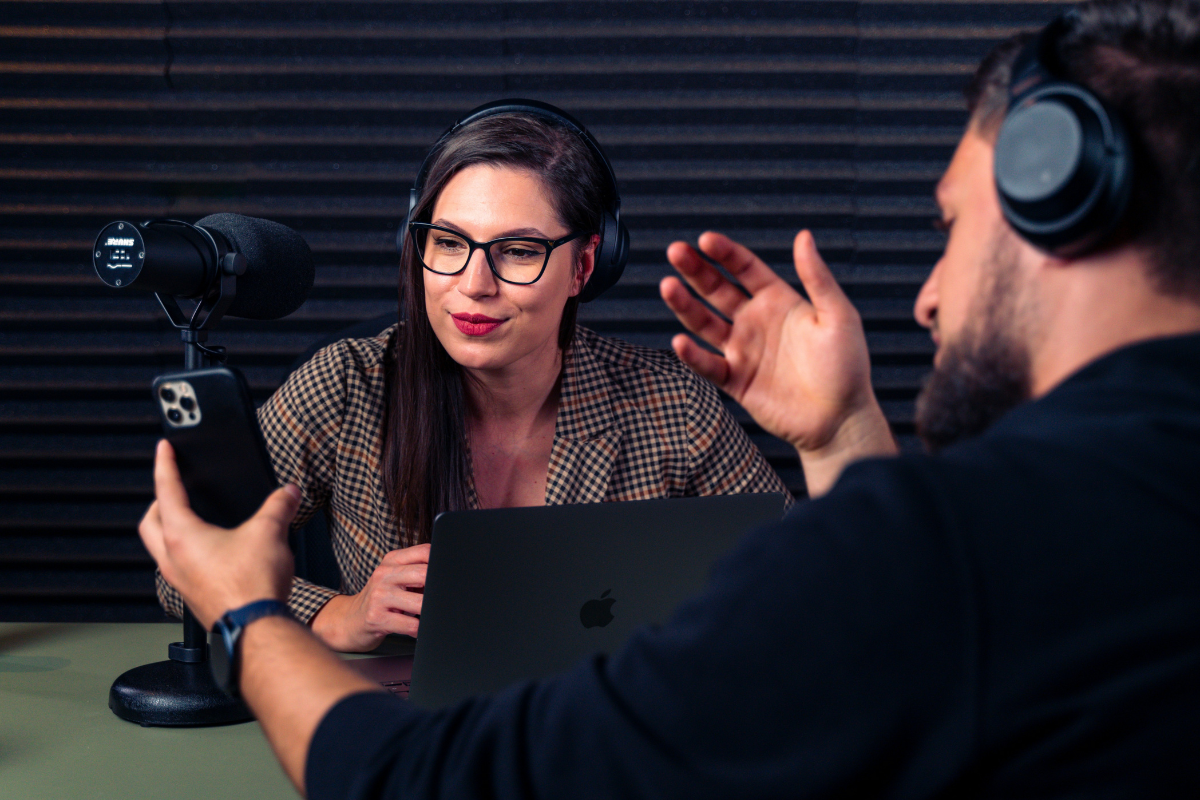“Thought leadership” is one of those buzzwords that makes most people want to roll their yes—it’s overused, and everyone seems to claim the title. Yet, in industries like coaching and training, standing out as a trusted expert is critical to attracting the right clients.
The big question is: How do you become a thought leader?
Most people talk about it, but few do it right. They churn out content that fails to make a lasting impression. Or even worse, they enlist the help of AI writing tools and fill their websites and social media profiles with generic and canned material that only adds to the clutter. This is definitely not the way to become a thought leader.
If you want to lead the way and truly connect with your audience, you need to break through the noise.
Enter podcasting.
When done right, a podcast is more than just a show—it’s a powerful tool for building authority, strengthening relationships, and highlighting the attributes that make you such a great answer to your dream client’s problems. It’s not about shouting, “I’m a thought leader!” or becoming famous—it’s about consistently delivering value that resonates with your audience.
In this article, I will explain why thought leadership is so important, how you can use podcasting to build thought leadership, and how this fits into a broader marketing strategy. By the end, you should have a clear idea of what podcasting can do for you and your business.
What is thought leadership, exactly?
In simple terms, thought leadership means becoming the go-to person for information and guidance in your industry or field. For coaching and training companies, this means leading the conversations that matter most to your clients—whether it’s personal growth, business strategies, or leadership techniques.
Thought leadership can come in many shapes and sizes, as what you are doing is sharing your ideas at scale with people who might be interested in them.
Here are some examples:
- Writing & research: books, articles, white papers, newsletters.
- Public speaking: interviews, conferences, webinars.
- Social media: YouTube videos, LinkedIn posts, industry-specific groups.
Why thought leadership matters for coaching and training businesses.
The coaching and training space is an industry that relies on trust. Your clients and prospects need to feel confident that you can help them reach the outcomes they are looking for. By sharing valuable insights regularly, you establish credibility, share your expertise, and build trust. Over time, your thought leadership initiatives can open doors to speaking gigs, media features, and industry collaborations, helping you reach a wider audience.
I’ve experienced this firsthand.
Back in 2012, my wife, cousin, and I launched a board game publishing company. We had zero industry credibility, so we decided to start a podcast interviewing board game designers and experts as a way to build our network. Over time, that podcast turned us into recognized authorities. What started as three people chatting about games in my basement became a respected show, earning a spot on The Dice Tower Network, the biggest podcast network in the space.

5 Ways podcasting helps you position yourself as a thought leader (when done right).
1. Podcasting can build authority through association.
When you host recognized experts on your podcast, you naturally align yourself with their credibility. You’re borrowing their authority while also giving your audience valuable insights. Inviting high-caliber guests not only elevates your show but also reinforces your status.
Take Leading Voices in Real Estate, one of our clients, as an example. By consistently featuring top-tier guests, Matt Slepin, the host, has garnered over 1.7 million listens and a 90% engagement rate. His podcast has become a trusted resource for industry professionals, cementing his position as a leading voice in the real estate space.
Another great example is the Coach Factory podcast by Motivations AI. When they approached us for help, their goal was to launch a podcast to promote their personality assessment tool. Given their expertise in the coaching space, we decided to leverage their network and develop a dynamic show with multiple interviews, that connected them directly with their ideal customers. By featuring coaching experts in their show, Coach Factory became a go-to resource, boosting Motivations AI’s authority in the market. And within three months of being live, we had major players in the space asking to be featured.
2. Podcasting builds intimacy with listeners.
Podcasting offers a level of intimacy that other mediums can’t match. It’s personal and conversational—like having a direct one-on-one conversation with your listeners. This sense of intimacy helps to build trust and loyalty over time.
One unique aspect of podcasting is the voice itself. Unlike text, where tone can sometimes be lost, podcasting lets your voice convey nuance, emotion, and authenticity. Video can help, too, but if you’re uncomfortable in front of the camera, audio offers a casual, low-pressure format that allows you to connect with your audience.
Listeners also tend to form parasocial relationships with podcast hosts—a one-sided emotional bond. In fact, the research paper “Why People Listen: Motivations and Outcomes of Podcast Listening” details how impactful these types of relationships are for listeners. This sort of intimacy positions you as a trusted advisor in your field, and by sharing your thoughts, stories, and expertise, listeners start to view you as someone they can rely on for advice and insights.
3. Podcasting allows you to share YOUR unique voice.
Podcasting is one of the few platforms where you can fully express your opinions, insights, and experiences without the constraints of word counts, brevity, or SEO keywords. It allows you to dive deep into complex topics, share stories, and offer a fresh perspective on the issues that matter most to your audience.
Most importantly, in a world where anyone can use AI to create loads of generic content, your podcast remains uniquely yours. AI can replicate a lot of things, but it can’t replicate your essence—the things that make you, you. No matter how much training and learning it does, AI is AI, and you are you. And by sharing your personal journey and opinions, you create content that is uniquely yours—something that no algorithm can copy.

4. Podcasting helps you stand out in a crowded market.
The coaching and training industry is incredibly competitive. Many businesses are vying for the same audience’s attention, often using similar marketing tactics. Podcasting can give you a unique edge. By sharing your perspective and expertise in an authentic and engaging way, you can differentiate yourself from the crowd.
From a branding standpoint, it’s about standing for something and making an impact. As one of our clients recently told me during a meeting, “It is difficult to put metrics to creative work… You could see how many times someone watches, downloads, or listens to a podcast. But what I measure is how people feel and talk about the brand. It ends up being more qualitative than quantitative.” When you produce meaningful content that resonates with your audience, you generate excitement and build a following beyond metrics.
Going back to the Coach Factory podcast I mentioned, we knew the competition in this space was fierce. The most recognized coaches already had a podcast of their own, and they were selective about how they spent their time. But thanks to thorough research and planning, we were able to create a podcast that resonated deeply with the coaching community. Within three months, the podcast became a sought-after show, with major players requesting to be guests.
5. Podcasting helps you build trust.
Unlike written content that can feel polished or over-edited, podcasts often come across as more authentic. Even when parts of the show are scripted, the candid nature of a conversation builds trust with your listeners.
A study by Acast found that 57% of consumers trust podcast hosts more than other types of content creators. This trust is invaluable, especially in an age where audiences are becoming increasingly skeptical of traditional marketing tactics. When you speak passionately and knowledgeably about your field, listeners start to see you as a genuine authority—not just someone trying to sell them a service.
Take my board game podcast as an example. The board game industry has some notable national conferences—Origins, Gen Con, and BGG Con, to name a few. We couldn’t attend a given conference on two occasions, and we mentioned it on the show. Within three days of the episodes going live, I received emails from our listeners who lived close to the conference, offering for us to stay at their house. One guy even specifically mentioned clearing it with his wife!
You don’t invite just anyone into your home. That kind of relationship is built on trust, and podcasts are the perfect platform for fostering it.
What about long-term brand positioning?
There is one thing I need to clarify, podcasting isn’t a quick-fix marketing tactic—it’s a long game. In fact, I’ve written about this before on LinkedIn. By consistently producing high-quality episodes, you build a library of valuable content that your audience can return to again and again. The more episodes you release, the more touchpoints you create for your brand. And it takes time to build this.
A great example is the work we’ve done for EOS Worldwide®. Instead of focusing on just one podcast, we helped them launch several shows, including We Run On EOS®, Rocket Fuel, Strong in Six, and The EOS® Life, and we also helped them repurpose an older audio project into Focus & Vision. Each podcast covers a different aspect of the brand, creating a network. This has led to rapport building with EOS Certified Implementers® and listeners, and cross-promotion opportunities. This kind of long-term brand positioning has a compounding effect, and as a result, they’ve remained at the top of Apple’s podcast charts for over 100 weeks.
Producing your own vs. guesting on other podcasts.
While producing your own podcast allows you to control the narrative and build a loyal audience, guesting on other podcasts can be equally beneficial. It allows you to borrow other people’s audiences and expands your network in ways you can’t always achieve on your own.
For instance, Meet Edgar, a SaaS company, generated over 1.25 million visitors and more than $329,000 in monthly recurring revenue just by guesting on other people’s podcasts. It’s a powerful way to build relationships and grow your reach without the full commitment of producing your own show.
Of course, producing your own show can also lead to gains. Some years ago, I ran a personal podcast with the goal of creating networking and collaboration opportunities for Come Alive. Thanks to my podcast, I had the opportunity to interview 100 guests—at least 75% of them were with people I would otherwise never have had a chance to talk to. I’ve been invited to guest on over 20 podcasts to share my message. I’ve received advance book copies of books and thousands of dollars worth of software, which I’ve used to improve what we do at Come Alive. And I was invited to guest on a Simplecast webinar to discuss this very topic.
Wrapping up.
Podcasting is more than just talking into a microphone—it’s about being intentional with your content, your guests, and your goals. Whether you’re producing your own show or guesting on others, podcasting offers a unique opportunity to position yourself as a thought leader, connect with your audience, and stand out in the crowded coaching and training space.
If you’re ready to start your own podcast or need help elevating an existing one, you can schedule a discovery call with our team today. Let’s talk about how we can help you create something that truly resonates.


